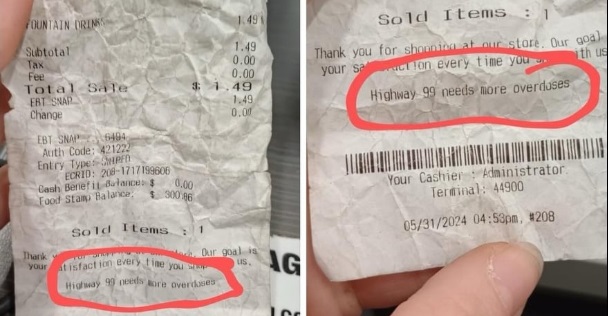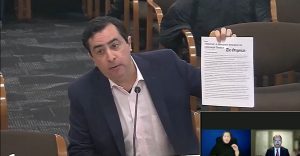Julie Lambert: Overdose deaths are no joke
5 min read
Hello Eugene, this is Julie Lambert reporting for KEPW 97.3 Eugene’s Resistance Radio, with an op-ed concerning the recent overdose deaths in our city.
Can a bittersweet story of ridicule, discrimination, prejudice, and callous disregard for human life in a convenience store on Highway 99 have a happy ending? Maybe it can.
Across town on Highway 99, Prit, a woman I did not know, was reporting to her job on Saturday morning, June 1, as a convenience store clerk, a job I once had myself, and not the kind of employment that would normally have me question my values and principles and indeed have to stand up for them, but then, for this, it was not going to be an ordinary day for her.
[00:00:48] Me, I was just turning on my computer and sipping my coffee, while she was probably in the process of making it, when, like many of us, I opened my Facebook feed to catch up with my friends, but I was not prepared for what I saw. Instead of pictures of kiddos, jokes, ads, grandmas, birthdays, there was a picture of what seemed to be an ordinary, innocuous receipt, but it wasn’t.
[00:01:13] It was from a convenience store at Highway 99, Eugene, Oregon, dated May 31, 2024. And that’s when I choked on my coffee. Printed at the bottom of the receipt were these inexplicable words: ‘Highway 99 needs more overdoses.’ The image of the receipt was shared on Facebook, accompanied by an all-caps comment: ARE YOU FREAKING KIDDING ME?
[00:01:40] The inexplicably insensitive caption was printed on all receipts until that morning, when it was caught by the heroine of our story, store clerk Prit. I met her when I went to the store that morning to see for myself: Was it an altered image? Was it AI? Something else, other than intentional? Because wishing death on your patrons is not the usual ‘Have a nice day.’
[00:02:09] She said she got a complaint about it, then read it, and was shocked herself. There was another employee that she referred to as ‘a white guy,’ that she thought might have put the offensive comment on the receipt, and contacted him and said, ‘Why would you do this?’
[00:02:27] And he told her, ‘Oh, no, it was a joke. I was joking with a customer.’ She said that it was not a joke to her, that it was not nice, said that it reflected badly not only on the store, but as herself as a representative, and that if other employees condoned that type of work, they could find other types of employment.
[00:02:49] Prit did the right, kind, and humane thing to do, and intervened on behalf of her customers and community, and immediately made an effort to find out why, just why. I wish we had more people like Prit. We encounter folks in our daily lives quietly doing their jobs and often bowing to the status quo while doing so. Not Prit. She saw something grossly inappropriate and acted quickly to fix it.
[00:03:15] Store owners usually print things like ‘Thank you for shopping with us,’ rather than death wishes. When reached for comment, the store owner indicated that Prit acted quickly to rectify the situation and that the responsible party was being dealt with, disciplined, although he did not say ‘fired.’
[00:03:35] What he did say was that the person had to write a letter of apology and that his performance would be monitored and that he did not condone such attitudes in his store.
[00:03:49] However, considering the store’s location, it could be an appropriate place on a receipt to print something to help prevent death, maybe not make fun of it.
[00:04:02] Accidental overdoses may be prevalent in this area. But most could be preventable with a simple fentanyl kit or Narcan freely distributed in our community with training included. I asked if he was interested in this training or if the lifesaving medication could be made available in a store or employees and he said he would consider it, but not at this time.
[00:04:25] He said that he had talked with the employee and that he was being written up and that he did not expound on what the apology letter would include or not include. But he did believe in giving youth a second chance, as he does understand that he lives in a community where drug use is rampant. And he does not have the solution, but he certainly doesn’t want to be part of the problem.
[00:04:52] He does not believe that the employee understood the ramifications of what he did, as it was not just one customer that he was making a joke with. It evolved to where he was making ‘jokes’ with many other customers because he did not take it off.
[00:05:08] We need more people like Prit who provides the service while staying true to her values, even if it’s something as innocuous and simple as a coffee transaction. We all have the ability to let each engagement have an imprint, for better or for worse, for us having crossed paths.
[00:05:21] They have a team member who cares not just about herself, not just about her job, not just about her store, but her community and defends it. She chose the right battle in not going along with the joke as fentanyl is killing our young people in record numbers. In the last five years, 332 Oregonians ages 25 to 34 have died from primarily drug-related causes, according to the Centers for Disease Control and Prevention.
[00:05:55] Addiction is considered a disability, and as such, is a protected class. And as such, the Human Rights Commission of Eugene will be following up on this, if it’s necessary.
[00:06:08] Tomorrow, Prit will be making coffee again, but now we know her as someone who stands with her values and her character as revealed when she saw something clearly wrong and righted it.
[00:06:21] Wherever she chooses to work on her career path, someone will be lucky to have an employee as conscientious as she is. It is easier to look away, and she did not. She did the right thing for herself, the store, and the community. Prit, I would love to have you in my corner any day.
[00:06:40] For more information on fentanyl test kits, naloxone, or Narcan in our area, contact the Fentanyl Aware campaign.
[00:06:49] Reporting for KEPW, this is Julie Lambert.






